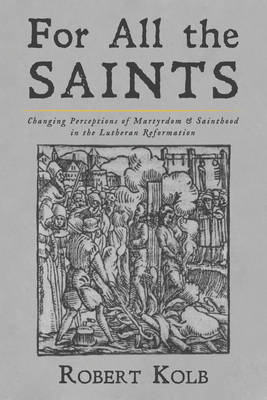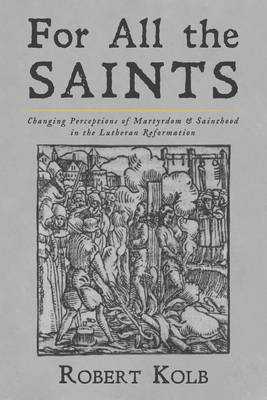
- Retrait gratuit dans votre magasin Club
- 7.000.000 titres dans notre catalogue
- Payer en toute sécurité
- Toujours un magasin près de chez vous
- Retrait gratuit dans votre magasin Club
- 7.000.000 titres dans notre catalogue
- Payer en toute sécurité
- Toujours un magasin près de chez vous
Description
Martyrs have long played a vital role in Christian life, thought, theology, and piety. Robert Kolb, an acknowledged authority on the history of the Lutheran Reformation in Germany, offers a thorough and illuminating analysis of the way German Lutherans changed the perceptions of martyrdom and sainthood. Protestant reformers professed that providential power over daily human life was reserved for God alone, and that mediation with God is provided by Jesus Christ alone. Martyrs and saints could no longer be worshiped or act as intercessors. But this did not mean their absence from the faith and piety of sixteenth-century Protestants. Instead, holy people were regarded as those who confessed the word and in that confession demonstrated and advertised the power of God. This book arose in response to some vexing questions: Why is the first of a long and distinguished line of Protestant martyrologists, Ludwig Rabus, the least noted? Why would he, a German Lutheran, have composed a book of martyrs? Kolb suggests that the answers are complex--they involve differences in historical and political situations and in specific dogmatic emphases of each reformation. Kolb's diligent research led him well beyond Rabus's martyrbook. His work encompasses material from the writings and biographies of Luther and Melanchthon, Wittenberg chronicles and calendars, and hymns and songs. The analysis of this material makes a significant contribution to the understanding of the Lutheran Reformation and of the changing roles of saints and martyrs in the history of Christianity.
Spécifications
Parties prenantes
- Auteur(s) :
- Editeur:
Contenu
- Nombre de pages :
- 224
- Langue:
- Anglais
Caractéristiques
- EAN:
- 9781532674952
- Date de parution :
- 03-06-20
- Format:
- Livre broché
- Format numérique:
- Trade paperback (VS)
- Dimensions :
- 152 mm x 229 mm
- Poids :
- 308 g







